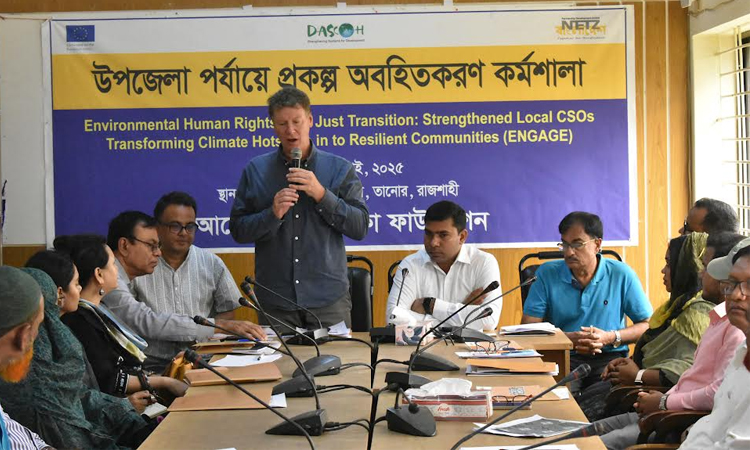News Flash
News Flash

RAJSHAHI, July 9, 2025 (BSS) - Speakers at a discussion unanimously viewed that integrated efforts of all the government and non-government organizations concerned can be the crucial means of ensuring environmental human rights in the region, particularly the Barind region.
The adverse impact of climate change has been posing a serious threat to the human rights of the marginalized population in the water-stressed region for the last couple of years. So there is no way but collaborative efforts.
Experts and development activists came up with the observation while addressing an inception workshop of a project at the conference hall of Tanore Upazila Parishad in the district on Tuesday.
DASCOH Foundation and NETZ Bangladesh jointly organized the workshop as part of the implementation of their project titled "Environmental Human Rights for a Just Transition: Strengthened Local CSOs Transforming Climate Hotspots into Resilient Communities (ENGAGE)".
Prof Chowdhury Sarwar Jahan from the Department of Geology and Mining at Rajshahi University addressed the workshop as a focal person disseminating his expertise on the adverse impact of climate change.
With Chief Executive Officer of DASCOH Foundation Akramul Haque in the chair, the meeting was addressed, among others, by Upazila Nirbahi Officer Liakat Salman, European Representative Hubert Blom, NETZ Bangladesh Director Shahidul Islam and its representative Sara Khatun.
During his keynote presentation, DASCOH Foundation Project Director Jahangir Alam Khan gave an overview of the project along with its goals, objectives and implementation strategy.
The project will be implemented in Tanore and Godagari Upazilas in Rajshahi district, while Manda and Mohadevpur Upazilas in Naogaon district with the main thrust of raising awareness among communities and public authorities along with sensitizing them.
Jahangir Khan said at least 75,630 most vulnerable people will benefit from capacity building, rapid support and advocacy to protect their rights and entitlements.
As a whole, the project is intended for inclusive and equitable participation and empowerment of the targeted people through their capacity building.
In his remarks, Prof Chowdhury Sarwar Jahan said inclusive policies are crucial to address the existing challenge.
He said a green and inclusive atmosphere needs to be ensured where humans enjoy nature and everyone can enjoy clean water, diverse plants and cultivate land for their basic needs and have access to responsible government institutions.